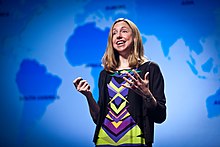Elizabeth Dunn
 From Wikipedia the free encyclopedia
From Wikipedia the free encyclopedia
Elizabeth Dunn | |
|---|---|
 Dunn in 2011 | |
| Born | 1978 (age 45–46) |
| Occupation | Professor |
| Academic background | |
| Education | BA., Harvard University MA., PhD, University of Virginia |
| Thesis | Misunderstanding the affective consequences of everyday social interactions: the hidden benefits of putting one's best foot forward (2004) |
| Academic advisors | Daniel Gilbert |
| Academic work | |
| Discipline | Social Psychology |
| Sub-discipline | Happiness |
| Institutions | University of New South Wales University of British Columbia |
| Doctoral students | Lara Aknin |
| Website | https://dunn.psych.ubc.ca |
Elizabeth Warren Dunn is a Canadian social psychologist and a Professor of Social Psychology at the University of British Columbia (UBC). In 2015, Dunn was elected a member of the College of New Scholars, Artists and Scientists within the Royal Society of Canada.
Education[edit]
Dunn conducted her undergraduate studies at Harvard University. While there, she worked under Daniel Gilbert which inspired her to study understanding human happiness.[1] As a graduate student, she was inspired to study how couples happiness changed with each other and with strangers.[2]
Career[edit]

After conducting her postdoctoral research, she joined the faculty at the University of British Columbia (UBC) in 2005.[3]
In 2008, she co-authored and published a study in Science which found that humans find giving to others rewarding and it increases their happiness levels.[4] Dunn and her team surveyed 109 UBC students who said they hypothetically would spending money on themselves than otherwise. However, once actually given the money, her team discovered they were happier spending it on others.[5] Two years later, Dunn received a New Investigator Award from the Canadian Institutes of Health Research and UBC’s Robert E. Knox Master Teacher Award.[3]
In 2012, she published "Giving Leads to Happiness in Young Children" with J. Kiley Hamlin and Lara Aknin, which supported the idea that humans may have evolved to find giving rewarding.[6] The next year, Dunn co-authored and published "Happy Money: The New Science of Smarter Spending" with Michael Norton.[7]
In 2015, Dunn was elected a member of the College of New Scholars, Artists and Scientists within the Royal Society of Canada.[8] She was also named a Social Sciences and Humanities Research Council of Canada (SSHRC) Impact Award Finalist.[9]
In 2019, she gave a TED talk. TED curator Chris Anderson listed it as one of his favourites of 2019. [10]
References[edit]
- ^ "July Lab of the Month: Dr. Elizabeth Dunn's Happy Lab will make you smile". psych.ubc.ca. July 1, 2016. Retrieved November 12, 2019.
- ^ "Talking to strangers can boost your happiness level". cbc.ca. August 23, 2015. Retrieved November 12, 2019.
- ^ a b "Elizabeth Dunn". dalailamacenter.org. 4 November 2010. Retrieved November 12, 2019.
- ^ Tobin, Anne-Marie (March 20, 2008). "Money can buy happiness, apparently". The Globe and Mail. Retrieved November 12, 2019.
- ^ "The Secret to Happiness? Giving". sciencemag.org. March 20, 2008. Retrieved November 12, 2019.
- ^ Enayati, Amanda (September 17, 2012). "For kids, it's better to give than receive". cnn.ca. Retrieved November 12, 2019.
- ^ Leong, Melissa (May 5, 2013). "Spending your way to happiness". Financial Post. Retrieved November 12, 2019.
- ^ "UBC faculty honoured by Royal Society of Canada". news.ubc.ca. September 22, 2015. Retrieved November 12, 2019.
- ^ "UBC Psychology Professor Elizabeth Dunn a SSHRC Impact Award Finalist". psych.ubc.ca. September 3, 2015. Retrieved November 12, 2019.
- ^ "Curator's Picks: Top 10 TED Talks of 2019 | TED Talks".
External links[edit]
- Elizabeth Dunn publications indexed by Google Scholar